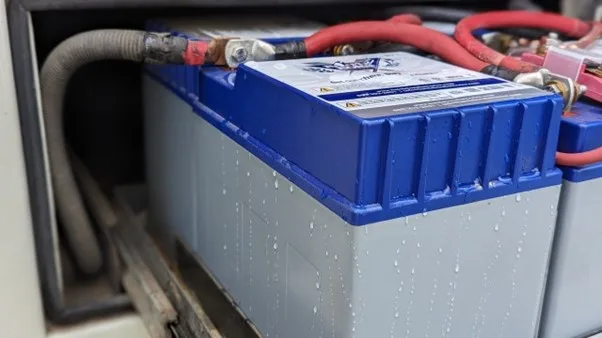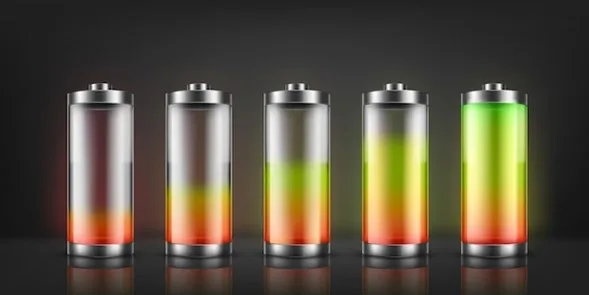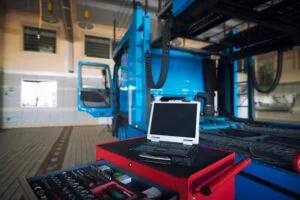Ontario is known for its unpredictable weather. From blistering summer heat to freezing winter temperatures, the province’s climate can have a significant impact on the performance of industrial batteries. Whether you’re using batteries in forklifts, backup power systems, or other heavy-duty equipment, understanding how weather affects battery life and performance is key to maintaining reliable operations.
In this blog, we’ll dive into how different weather conditions in Ontario influence industrial batteries. We’ll also explore ways you can protect your batteries from extreme weather and ensure they operate at peak efficiency.
The Impact of Ontario’s Weather on Industrial Batteries
Ontario’s diverse climate, which includes hot summers and harsh winters, can have varying effects on the performance and lifespan of industrial batteries. Understanding these effects is crucial for businesses relying on industrial equipment that runs on batteries.
1. Hot Weather Effects on Industrial Batteries
During the summer months, Ontario can experience high temperatures that impact industrial batteries in several ways:
- Overheating:
Batteries are sensitive to temperature fluctuations. In hot weather, the chemical reactions inside the battery accelerate, which can cause the battery to overheat. Overheated batteries may suffer from reduced capacity, shorter lifespan, or even permanent damage. - Increased Rate of Degradation:
The high temperatures can cause the materials inside the battery, especially lead or lithium, to degrade faster. As a result, the battery may not hold a charge as effectively and will require more frequent recharging, leading to more wear and tear over time. - Gas Build-up:
For lead-acid batteries, excessive heat can cause the electrolyte to evaporate, leading to gas build-up inside the battery. This can result in leakage, corrosion, or even hazardous conditions that require immediate attention.
2. Cold Weather Effects on Industrial Batteries
Ontario winters can bring freezing temperatures that are equally challenging for industrial batteries. Cold weather impacts battery performance in the following ways:
- Reduced Capacity:
Cold temperatures slow down the chemical reactions inside the battery, reducing its capacity to store and deliver power. As a result, the battery may not provide enough energy to operate industrial equipment efficiently, causing downtime and productivity loss. - Slower Charging:
In cold weather, batteries take longer to charge due to slower chemical reactions. If the battery isn’t fully charged before use, it may not provide enough power for long shifts or operations. - Risk of Freezing:
In extreme cold, the electrolyte inside the battery can freeze, causing the battery to fail completely. While this is more common in flooded lead-acid batteries, it can happen with other types of batteries if not properly maintained and protected.
3. Temperature Fluctuations: A Double-Edged Sword
Ontario experiences significant temperature fluctuations between seasons. During the transition between summer and winter, the sudden temperature changes can stress industrial batteries, leading to:
- Thermal Cycling Damage:
When temperatures rapidly change, the battery’s internal components expand and contract. This constant cycling can cause physical damage to the battery, leading to cracks, leaks, or internal short circuits. - Condensation:
As temperatures shift, condensation can form inside the battery, which may result in moisture build-up. This moisture can lead to corrosion on battery terminals or other metal components, reducing the battery’s efficiency and lifespan.
How to Protect Your Industrial Batteries from Weather Effects

Now that we know how weather conditions in Ontario can affect industrial battery performance, it’s time to discuss how to protect your investment. Here are several strategies you can use to shield your batteries from the adverse effects of extreme temperatures.
1. Choose the Right Battery Type for Your Needs
Not all industrial batteries are created equal, and some types are more suited to handle extreme temperatures than others. For example:
- Gel Batteries:
Gel batteries, a type of valve-regulated lead-acid (VRLA) battery, are more resistant to heat and cold than traditional flooded lead-acid batteries. They are sealed and less prone to issues caused by temperature extremes. - Lithium-Ion Batteries:
Lithium-ion batteries are known for their superior performance in a wide range of temperatures. While they may still be affected by extreme conditions, their overall temperature tolerance is higher than traditional lead-acid batteries. - Flooded Lead-Acid Batteries:
Flooded lead-acid batteries are more vulnerable to temperature changes and may require more frequent maintenance in extreme weather conditions. If you use these types of batteries, you’ll need to monitor them closely during hot or cold weather.
2. Use Battery Insulation
Battery insulation is an effective way to protect your industrial batteries from both heat and cold. Insulating your batteries helps maintain a stable internal temperature, preventing overheating during summer and freezing during winter. Insulation materials like thermal wraps can keep the batteries in a consistent temperature range, improving performance and extending their lifespan.
3. Store Batteries in a Temperature-Controlled Environment
If possible, store your batteries in a climate-controlled environment. This is particularly important for spare or backup batteries that are not in use regularly. Keeping them at a consistent temperature prevents the risk of degradation and ensures they are ready to use when needed.
4. Maintain Regular Battery Monitoring
Routine monitoring is essential to catch issues before they cause major problems. Check your batteries regularly for signs of corrosion, leaks, or other damage. Use a battery management system (BMS) to keep track of key metrics like temperature, voltage, and charge cycles. BMS can alert you to potential problems, allowing you to address them before the weather exacerbates the situation.
5. Ensure Proper Charging Practices
Proper charging is especially important when the weather is extreme. Avoid overcharging or undercharging your batteries, as this can lead to inefficiency, overheating, or damage. Always follow the manufacturer’s charging guidelines, and consider using a smart charger that can adjust to different temperatures automatically.
6. Consider Emergency Backup Power Solutions
In case of power outages or battery failure, having a reliable backup power solution in place is critical. Industrial Batteries Accessories Ltd. offers high-quality backup battery systems and maintenance services to ensure your equipment remains operational, even in adverse weather conditions. Having a backup power supply can prevent disruptions to your business, no matter what the weather brings.
Effects of Weather on Different Battery Types

| Battery Type | Effect of Hot Weather | Effect of Cold Weather | Best for Weather Resistance |
| Gel Batteries | Less prone to overheating | Performs well in cold weather | Excellent all-round choice |
| Lithium-Ion | Resists heat better than lead-acid | Performs well in cold, but needs temperature management | Best overall for weather extremes |
| Flooded Lead-Acid | Overheating can reduce lifespan | Susceptible to freezing, requires maintenance | Less suitable for extreme weather |
| AGM Batteries | Good heat tolerance | Less effective in cold weather | Better than flooded lead-acid, but not ideal for freezing temps |
FAQs
1. How does hot weather affect my industrial batteries?
Hot weather accelerates the degradation of industrial batteries, leading to reduced capacity and a shorter lifespan. Overheating can also cause gas build-up, leakage, or failure.
2. Can cold temperatures cause industrial batteries to freeze?
Yes, extreme cold can cause the electrolyte inside some battery types, like flooded lead-acid batteries, to freeze. This can result in complete battery failure.
3. What are the best battery types for extreme weather conditions?
Gel and lithium-ion batteries perform better in extreme temperatures than flooded lead-acid batteries, offering superior weather resistance and reliability.
4. How can I prevent my batteries from being affected by Ontario’s weather?
Insulate your batteries, store them in temperature-controlled environments, and use battery management systems to monitor their condition.
5. What should I do if my battery shows signs of damage due to weather?
If you notice corrosion, leaks, or reduced performance, contact a professional battery technician for inspection and maintenance to prevent further damage.
Conclusion
Ontario’s weather conditions can significantly affect the performance and lifespan of industrial batteries. Extreme temperatures—whether hot or cold—can cause batteries to degrade faster, reduce their efficiency, and even lead to complete failure. By understanding how weather impacts your industrial batteries, choosing the right battery types, and implementing proper maintenance and insulation practices, you can protect your batteries from weather-related damage and keep your operations running smoothly.
At Industrial Batteries Accessories Ltd., we offer a wide range of battery solutions and services to help you manage the effects of Ontario’s unpredictable climate on your industrial equipment. Whether you need advice on battery types or emergency replacements, our team is here to ensure that your equipment performs reliably, no matter the weather.






